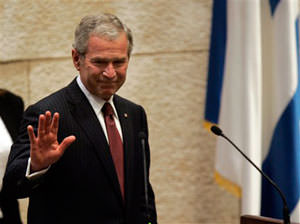The False Comfort of War
We have focused almost exclusively on George Bush's "appeasement" remarks as an indirect assault on Barack Obama and his other critics. That is immaterial, for Bush's text perpetuates the wrongheadedness and false assumptions of our posture in the world today.
George W. Bush appears in Israel, speaks to its parliament, and, in his familiar, muscular manner, reiterates his determination to use our military prowess to ward off aggressors. What a guy! His international cowboy act toppled Saddam Hussein, our onetime friend, who for more than 20 years stood as a surrogate counterweight to the ambitions of Iran. Now Israel, Bush’s newfound friend, is left naked and vulnerable to Iran, and with a new threat of nuclear war in the region. For all our trouble, Saddam is dead and Iraq is nothing more than an oil well (when it is being pumped), hardly serving our interests — or Israel’s. Except, perhaps, as another military base.
Bush’s constant posture as the great friend of the Israelis is absurd. Who destroyed Iraq — that buffer state for Israel against the threat from Iran, the 1991 Scuds notwithstanding? Are the Israelis supposed to rely on the current Iraqi government, that bulwark of democracy with its close ties to Tehran?
Bush’s appearance has aroused nearly universal condemnation, if not embarrassment. Even John McCain, another newfound friend, has sought some distance. Alas! There always is Joe Lieberman. Bush has a place at his table for newfound friends.
Two wars are not enough for this president. He seems eager for a third, or a fourth, before we are rid of him, and he can doom his successor to perpetual war or the perpetual agony of retreat. Iran, Hamas, Hezbollah — he will not talk or negotiate with the likes of such characters. Our George is no appeaser. Bring ’em on.
But Bush is unwilling to carry a big stick — or even speak loudly — to deal with Burma’s corrupt, repressive military as that nation reels from natural calamity. Or with the glaring evidence of genocide in Sudan. And what about Zimbabwe’s “democracy” Does he have a blind eye or have we underestimated him? Maybe after all he recognizes some limits on American power?
We have focused almost exclusively on Bush’s remarks as an indirect assault on Barack Obama and his other critics. That is immaterial, for Bush’s text perpetuates the wrongheadedness and false assumptions of our posture in the world today. He berated those who would negotiate with terrorists and radicals. “We have heard this foolish delusion before,” he told the Israelis. “That delusion was the false comfort of appeasement,” one long discredited by history, he added. But his history is flawed, as often is the case.
Appeasement is one of those charged words, all too often distorted and devoid of any historical sense. Appeasement is automatically linked in our minds to the coming of World War II, almost as if it were the cause. We famously dredge up British Prime Minister Neville Chamberlain’s flight to Munich to meet with Adolf Hitler, in the forlorn hope of deterring him from his aggressive course in Czechoslovakia. Chamberlain returned to Britain, standing under the now-symbolic umbrella, waving a piece of paper, and proclaiming “peace in our time.” A year later, England found itself at war with Hitler. Talking had ended, and the lesson was there for all to see: Talking, negotiating with terrorists or radicals, is only futile.
Rescuing Chamberlain from history is a formidable task, but let us be fair. The Western powers first backed down when Hitler invaded the Rhineland in 1936 to restore the lands to German sovereignty. At the time of the Czechoslovakian crisis, the reality was that England and France simply lacked the military capability to confront Hitler. With no capability, there could be no resolve. But after Chamberlain returned, England began to rearm, resulting in a better-prepared nation to withstand the Nazi air assault in 1940.
We indeed should remember the lessons of the past, but let us understand them fully and completely, devoid of slogans and posturing. Trying to talk sense to Hitler without any military preparation indeed proved fruitless. The United States in 1938, as militarily incapable as the British and French, proved unwilling to pursue any course other than neutrality.
George Bush speaks in a different world. Certainly, the United States today is not without military force, and certainly, given our adventures of the past several decades, we are not unwilling to unleash it — wisely or otherwise.
Beyond Bush’s perpetuation of historical fallacies, we are left with the emptiness of his slogans. We talk, in fact, to the still-extant parts of the “axis of evil” quite regularly. Recent agreements with North Korea did not result from moving around tea leaves. We talk to the Iranians, back-channel or on the ambassadorial level in the Green Zone in Baghdad.
Consider the Israelis, usually quite realistic toward understanding facts on the ground. They talk to Hamas and Hezbollah intermittently, negotiating prisoner exchanges, and exactly what else we do not entirely know. And no one knows this better than the members of the Knesset. A rare moment of politeness undoubtedly permeated that otherwise chaotic chamber as they listened to Bush’s nonsense. Obama has said, “I want to have direct talks with countries like Iran and Syria because I don’t believe we can stabilize the region unless not just our friends but also our enemies are involved in these discussions.” Syria? How interesting. We know Syria proved a ready recipient for the rendition of alleged terrorists to make them “talk.” (Apparently at that time, we were not yet in our own torture mode.) So, shall we allow Syria only to torture on our behalf, or shall we pursue peace with Syria?
And the Israelis? They have been in lengthy negotiations for years with Syria. The promise of a settlement between the two has long been in the offing, and that — not John McCain, to be sure — might well be the Iranians’ worst nightmare. Is talking the “foolish delusion” that Bush so self-righteously, so self-assuredly, proclaimed? Fortunately, the Israelis don’t think so. Or for that matter, even this administration. Whom is Bush kidding? No diplomacy, no peace.
Stanley Kutler is the author of “The Wars of Watergate” and numerous works in American history and constitutional law.
Your support matters…Independent journalism is under threat and overshadowed by heavily funded mainstream media.
You can help level the playing field. Become a member.
Your tax-deductible contribution keeps us digging beneath the headlines to give you thought-provoking, investigative reporting and analysis that unearths what's really happening- without compromise.
Give today to support our courageous, independent journalists.






You need to be a supporter to comment.
There are currently no responses to this article.
Be the first to respond.